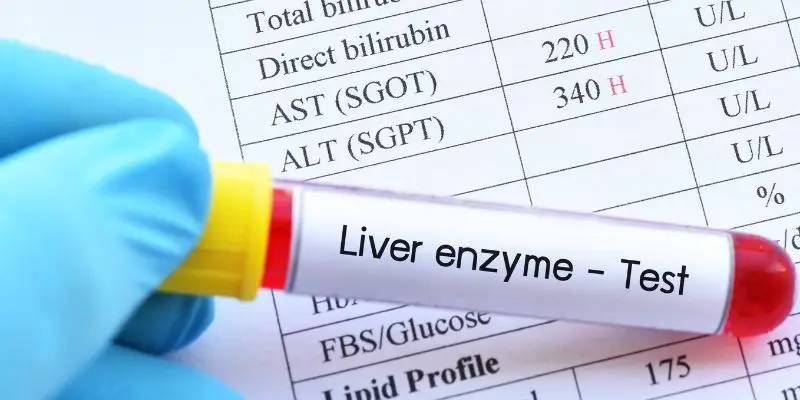Suppose your dog has recently been diagnosed with elevated liver enzymes. In that case, you may be wondering what this means for your pet.
The liver performs various critical functions in the canine body, leading to difficulties if the liver is ever impaired.
So, what could cause a dog’s liver enzymes to rise? And what should you give your dog if this happens? What To Feed A Dog With High Liver Enzymes?
This post will address these and many additional concerns about elevated liver enzymes in dogs.
Do you have a specific question about treating a dog with high liver enzymes? Then use the table of contents below to jump to the most relevant section. And you can always go back by clicking on the black arrow in the right bottom corner of the page. Also, please note that some of the links in this article may be affiliate links. For more details, check the Disclosure section at the bottom of the page.
Here's what we'll cover:
- What does it mean when a dogs liver enzymes are high?
- Elevated liver enzymes in dogs: main symptoms
- What causes an increase in a dog’s liver enzymes?
- Does elevated liver enzymes in dogs mean cancer?
- Can dog food cause elevated liver enzymes?
- What to feed a dog with high liver enzymes?
- How to treat elevated liver enzymes in dogs?
- How long can a dog live with high liver enzymes?
- How to lower liver enzymes in dogs naturally?
What does it mean when a dogs liver enzymes are high?
Liver enzymes are in charge of numerous functions of the liver. This vital organ regulates and filters many different compounds and chemicals in the blood and produces bile.
The best method to protect your dog’s liver health is to control some of the many external factors affecting your dog’s liver enzyme levels.
Other liver values in your dog’s blood panel will be visible. Still, I’d like to focus on the liver enzymes and what they signify.
AST stands for aspartate transaminase (formerly SGOT or serum glutamic oxaloacetic transaminase). If your dog’s AST level is high, it could be due to liver dysfunction, but it can also be found in red blood cells, the heart, muscle, pancreas, and bile. If your dog’s AST is higher than average, your vet should investigate the cause. Because AST is generally low in serum, it should be evaluated with ALT as part of a liver panel to determine what’s going on.

Alanine aminotransferase (ALT) (previously called SGPT or serum glutamic pyruvic transaminase). If raised, ALT can indicate a liver or hepatic alert as to liver cell death… However, because this enzyme is produced by both the kidney and the intestines, liver disorders aren’t the primary cause of elevated ALT, and more investigation is required.
ALP – Alkaline phosphatase – is found in the bone, kidney, colon (intestines), placenta (if pregnant), and liver. The bone and liver have the highest quantities of this enzyme. Because phosphatase is a homodimeric enzyme abundant in young, fast-growing animals, increased ALP levels in young canines are not uncommon. However, regardless of your dog’s age, consult with your veterinarian to determine the cause if ALP is increased.
GGT stands for Gamma-glutamyl transferase. This enzyme can help diagnose and monitor hepatobiliary (liver and bile) illnesses. The most sensitive enzymatic biomarker of liver damage is GGT. So if you are concerned about your dog’s liver health, be sure that GGT is included in the panel.
I want to emphasize the importance of a GGT test. This enzyme is not always measured by vets, but it is vital, so make sure you request it.
Elevated liver enzymes in dogs: main symptoms
The following are the most prevalent signs of canine liver disease:
- Jaundice
- Urination has increased.
- Seizures
- Vomiting
- Food interest has waned
If you detect any of these signs, take your dog to the vet.
What causes an increase in a dog’s liver enzymes?
In terms of primary liver diseases, the most substantial ALT elevations are caused by consuming particular chemicals or chronic inflammation of the liver (due to infection, an over-reaction of the immune system, hereditary disorders, etc.).
As a result, various variables can contribute to increased liver enzymes in dogs. Here are a few examples:
Medications

Seizure medications such as phenytoin and phenobarbital and any other drug, including heartworm medication and anti-inflammatory drugs, can induce abnormal liver enzymes. So if your dog is on any medication, your vet should always be there to check whether that is the cause.
Vaccine adjuvants
Virus infections and immunizations for viral disorders can have an impact on liver enzyme tests. For example, the Hepatitis B vaccine causes liver damage in humans primarily because it contains the hazardous vaccine adjuvant aluminum hydroxide, a common aluminum salt adjuvant included in all veterinary vaccines. The aluminum hydroxide adjuvant also causes motor neuron autoimmunity in Gulf War Syndrome patients. This syndrome has been proven to be indistinguishable from the autoimmune disease ALS, also known as Lou Gehrig’s disease. This is similar to what happens in MS, or multiple sclerosis, another neurological illness, and I have seen cases of this type of condition in dogs after immunization.
Aluminum hydroxide also produced mitochondrial dysfunction and cell death in mice livers given low dosages of the Hepatitis B vaccine. In addition, only one day after vaccination, the expression of 144 genes in mice livers changed. Hepatogastroenterology found in 2002 that the Hepatitis B vaccine was linked to an increased risk of hepatitis, gastrointestinal disease, and other liver function tests .
Endocrine disrupting chemicals
EDCs, or endocrine-disrupting substances, are another key factor that can impact the liver. Hormones, pesticides, and herbicides are also prevalent in our food and water supplies.
Viral Or Bacterial Infections

Viral or bacterial infections can seriously harm a dog’s liver.
These disorders frequently result in unexpected sickness in otherwise healthy dogs, with raised liver (and kidney) enzymes on bloodwork.
Though these illnesses can affect their liver, you will most likely notice several warning symptoms in addition to their abnormal blood work.
Infected dogs may have vomiting, diarrhea, lethargy, weakness, convulsions, and neurological problems.
If your veterinarian suspects a viral or bacterial infection, they will most likely advise immediate hospitalization.
Some of these disorders can cause liver and kidney damage to the point of organ failure. Thus prompt treatment is generally required.
Leptospirosis, viral hepatitis, and Lyme disease are some of the most frequent infections that our puppies can get.
Trauma is a potential cause of elevated liver enzymes

Another possible reason for increased liver enzymes in dogs is liver trauma.
It can seriously harm the liver and the cells that inhabit it, resulting in a significant reduction in liver function.
Liver injuries can result from extreme heat strokes, toxins, or even abdominal injury.
Heatstroke, for example, can injure the hepatocytes within the liver, causing long-term damage if not treated.
Suppose trauma is the source of your dog’s increased liver enzymes. In that case, your veterinarian will need to devise a treatment plan that addresses the specific trauma they experienced.
Because liver trauma can be caused by anything from heatstroke to toxins, the primary issue must be treated to support the liver.
Does elevated liver enzymes in dogs mean cancer?

Cancer can cause elevated liver enzymes. However, it is not the sole reason for this, as previously explained.
Another probable reason for increased liver enzymes in dogs is primary or secondary cancer.
Dogs can acquire liver tumors, which usually grow slowly within the organ, or malignant cancer, spreading throughout the body and affecting the liver.
Cancer can be detected due to high levels and is then confirmed by further examination of the organ with an ultrasound.
While each metric may increase, the ALT and GGT may be the most affected.
In general, dogs with liver cancer have two therapy options.
Some slow-growing tumors can be surgically removed because the liver can recover even after a big piece of it is removed.
If the tumor cannot be removed, some pet owners choose chemotherapy to delay the disease’s progression.
Some owners want to avoid aggressive therapy and simply keep their dogs as comfortable as possible until they say the last goodbye.
Can dog food cause elevated liver enzymes?

Yes, dog food can impact your dog’s liver health. First, as previously stated, kibble can contain hazardous mycotoxins known as aflatoxins. Aflatoxins primarily harm the liver, resulting in jaundice, weight loss, and fatigue… and the consequences can be fatal.
Second, most manufactured pet diets contain synthetic vitamins and minerals, pesticides, and other contaminants. As a result, the body must work harder to detox these poisons, which strain the liver.
Third, kibbles include hazardous byproducts such as heterocyclic amines and acrylamides due to the high heat of processing. These put additional strain on your dog’s liver.
What to feed a dog with high liver enzymes?
It is important to provide your dog a diet that nourishes his liver, particularly fresh one, whole food, raw-meat based, and free of synthetic chemicals. In addition, feeding the liver benefits your dog’s own organ… You can also include liver-friendly foods like dandelion greens, broccoli sprouts, spinach, fermented vegetables, and mushrooms.
What is the best dog food for a dog with high liver enzymes?
You can discuss a specific recommendation with your veterinarian. But, off the top of my head, is a highly delicious and digestible dog food low in copper and high in minerals that assist liver function.
What should dogs with high liver enzymes not eat?
“Foods such as organ meats and fish include greater quantities of some chemicals (purines, certain amino acids) that can be especially toxic to dogs with severe liver illness.”
How to treat elevated liver enzymes in dogs?
If your dog has increased liver enzymes, the optimal treatment method will depend on their unique situation.
Each of the criteria discussed above will necessitate a unique treatment strategy that will provide the dog with the best chance of recovery.
Suppose the precise cause of a dog’s liver distress is unknown. In that case, your veterinarian will most likely recommend more diagnostics to pinpoint the problem.
These tests may involve an abdomen ultrasound, x-rays, and possibly a liver biopsy in some situations.
Suppose a dog presents with symptoms of illness and is discovered to have increased liver enzymes. In that case, the veterinarian will frequently recommend hospitalization.
Your veterinarian will be able to rehydrate them, provide medication to treat their symptoms and monitor their liver functions for any improvement or deterioration.
If a dog’s liver values worsen following hospitalization, your veterinarian may discuss their quality of life in the future.
Suppose a dog improves in the hospital or is not in serious condition when they arrive. In that case, your veterinarian may recommend an at-home treatment plan in the future.
Your veterinarian can provide medicine to help a compromised liver and a diet that is easier for the liver to digest.
Your veterinarian will most likely recommend regular bloodwork for your puppy in the future, as it is critical to be aware of any potential issues.
How long can a dog live with high liver enzymes?
The length of time your dog can live with increased liver enzymes is determined by the cause of the abnormal results. That is why you should request a GGT test from your veterinarian to assist you in determining the reasons for your dog’s high enzyme levels. Then, when you know what’s wrong, you can address the underlying issue.
The liver is the most vital internal organ and is open 24 hours a day, 365 days a year. Maintaining liver health is critical because this organ is involved in every biological action. Following a natural lifestyle will help your dog avoid putting this vital organ, which helps detoxify the body from our increasingly toxic world, at risk.
Dogs with liver disease or injury have a life expectancy ranging from 6 months to 3 years.
How to lower liver enzymes in dogs naturally?

Dietary adjustments are frequently beneficial. For example, your dog may require a diet to ensure that they get the nutrients and calories that its liver needs.
Green vegetables include essential vitamins and minerals and natural cleansers and antioxidants that aid in purifying the blood and liver. In addition, green veggies, such as green beans, squash, or asparagus, combined with carrots, can provide your pet with fresh enzymes and extra nourishment.
Thanks for the blog graphics: Canva.com

Thanks for the blog graphics: Canva.com
Doghint.com is a participant of several affiliate programs. The list includes (but not limited to) the following: VigLink, Refersion, ShareASale, and Amazon Services LLC Associates Program, an affiliate advertising program designed to provide a mean for us to earn fees by linking to Amazon.com and affiliated sites. Doghint.com does not intend to provide veterinary advice. All published articles are meant for informational purposes only and not substitute the professional veterinary consultation.


